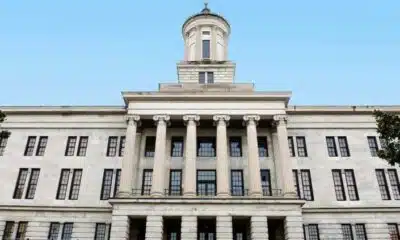News from the South - Alabama News Feed
BREAKING: US House passes massive tax break and spending cut bill, sending it to Trump
by Jennifer Shutt and Ariana Figueroa, Alabama Reflector
July 3, 2025
WASHINGTON — U.S. House Republicans cleared the “big, beautiful bill” for President Donald Trump’s signature Thursday, marking an end to the painstaking months-long negotiations that began just after voters gave the GOP unified control of Washington during last year’s elections.
The final 218-214 vote on the expansive tax and spending cuts package marked a significant victory for Speaker Mike Johnson, R-La., and Senate Majority Leader John Thune, R-S.D., who were able to unify centrist and far-right members of the party against long odds and narrow majorities.
But the legislation’s real-world impacts include millions of Americans expected to lose access to Medicaid through new requirements and slashed spending, and state governments taking on a share of costs for a key nutrition program for low-income families. If voters oppose Republicans at the ballot box in return, it could mean the GOP loses the House during next year’s midterm elections.
In the end just two Republicans in the House and three in the Senate opposed the measure, which the Senate approved earlier in the week with Vice President JD Vance casting the tie-breaking vote.
Trump posted on social media numerous times in the days leading up to the vote, thanking supportive Republicans who were praising the bill during interviews and threatening to back primary challenges against GOP lawmakers who stood in the way of passage.
“Largest Tax Cuts in History and a Booming Economy vs. Biggest Tax Increase in History, and a Failed Economy,” Trump posted just after midnight when it wasn’t yet clear the bill would pass. “What are the Republicans waiting for??? What are you trying to prove??? MAGA IS NOT HAPPY, AND IT’S COSTING YOU VOTES!!!”
Trump told reporters while on his way to Iowa for an event that he would sign the bill at 5 p.m. Eastern on Friday, with military aircraft flying over the White House and Republican lawmakers in attendance.
Johnson said during a floor speech the legislation is a direct result of the November elections, when voters gave the GOP control of the House, Senate and the White House.
“That election was decisive. It was a bellwether. It was a time for choosing,” Johnson said. “And I tell you what — the American people chose, overwhelmingly, they chose the Republican Party.”
House Speaker Mike Johnson, R-La., speaks to reporters inside the Capitol building in Washington., D.C., on Wednesday, July 2, 2025. (Photo by Jennifer Shutt/States Newsroom)
The package, he said, would make the country “stronger, safer and more prosperous than ever before.”
“We’ve had spirited debates, we’ve had months of deliberation and now we are finally ready to fulfill our promise to the American people,” Johnson said.
Republicans were spurred to write the tax provisions in the legislation to avoid a cliff at the end of the year, created by the party’s 2017 tax law. But the legislation holds dozens of other provisions as well, spanning border security, defense, energy production, health care and higher education aid.
The bill raises the country’s debt limit by $5 trillion, a staggering figure that many fiscal hawks would have once balked at, but is enough to get Republicans past the midterm elections before they’ll have to negotiate another deal to raise the country’s borrowing limit.
The nonpartisan Congressional Budget Office’s latest analysis of the measure projects it would add $3.4 trillion to deficits during the next decade compared to current law.
Jeffries: “It guts Medicaid’
House Minority Leader Hakeem Jeffries, D-N.Y., called the health care provisions “reckless” during a speech that lasted nearly nine hours, forcing the vote to take place in the afternoon rather than early morning, and said the “bill represents the largest cut to health care in American history.”
House Democratic Leader Hakeem Jeffries, D-N.Y., set a record for the length of a floor speech on July 3, 2025, while speaking against Republicans’ reconciliation package. (Screenshot from House webcast)
“Almost $1 trillion in cuts to Medicaid,” Jeffries said. “This runs directly contrary to what President Trump indicated in January, which was that he was going to love and cherish Medicaid. Nothing about this bill loves and cherishes Medicaid. It guts Medicaid.”
The speech broke the eight-hour-and-32-minute record that then-Minority Leader Kevin McCarthy, R-Calif., set in 2021 when he sought to delay Democrats from passing a $1.9 trillion coronavirus relief package. House leaders are allowed to exceed normal speaking limits through a privilege called the “magic minute.”
The nonpartisan health research organization KFF’s analysis of the package shows it would reduce federal spending on Medicaid by nearly $1 trillion during the next decade and lead to 11.8 million people becoming uninsured.
!function(){“use strict”;window.addEventListener(“message”,(function(a){if(void 0!==a.data[“datawrapper-height”]){var e=document.querySelectorAll(“iframe”);for(var t in a.data[“datawrapper-height”])for(var r,i=0;r=e[i];i++)if(r.contentWindow===a.source){var d=a.data[“datawrapper-height”][t]+”px”;r.style.height=d}}}))}();
Republicans made numerous changes to the state-federal health program for lower income people and some people with disabilities, including a requirement that some enrollees work, participate in community service, or attend an educational program for at least 80 hours a month.
Medicaid patients will no longer be able to have their care covered at Planned Parenthood for routine appointments, like annual physicals and cancer screenings, for one year. Congress has barred federal taxpayer dollars from going to abortions with limited exceptions for decades, but the new provision will block all Medicaid funding from going to Planned Parenthood, likely leading some of its clinics to close.
Overnight drama
House passage followed several frenzied days on Capitol Hill as congressional leaders and Trump sought to sway holdouts to their side ahead of a self-imposed Fourth of July deadline.
The Senate, and then later the House, held overnight sessions followed by dramatic votes where several Republicans, who said publicly they didn’t actually like the bill, voted to approve it anyway.
GOP leaders didn’t have much room for error amid a narrow 53-seat Senate majority and a 220-212 advantage in the House. That delicate balance hovered in the background during the last several months, as talks over dozens of policy changes and spending cuts in the bill appeared deadlocked.
Any modifications meant to bring on board far-right members of the party had to be weighed against the policy goals of centrist lawmakers, who are most at risk of losing their seats during next year’s elections.
The House passed its first version of the bill following a 215-214 vote in May, sending the legislation to the Senate, where Republicans in that chamber spent several weeks deciding which policies they could support and which they wanted to remove or rework.
The measure changed substantially to comply with the complex rules for moving a budget reconciliation bill through the upper chamber. GOP leaders chose to use that process, instead of moving the package through the regular legislative pathway, to avoid having to negotiate with Democrats to get past the Senate’s 60-vote legislative filibuster.
In the end nearly every one of the 273 Republicans in Congress approved the behemoth 870-page bill.
Maine’s Susan Collins, Kentucky’s Rand Paul and North Carolina’s Thom Tillis voted against it in the Senate and Pennsylvania Rep. Brian Fitzpatrick and Kentucky Rep. Thomas Massie opposed passage in the House.
Fitzpatrick wrote in a statement that while he voted to approve the House’s original version of the bill, he couldn’t support changes made in the Senate.
“I voted to strengthen Medicaid protections, to permanently extend middle class tax cuts, for enhanced small business tax relief, and for historic investments in our border security and our military.” Fitzpatrick wrote. “However, it was the Senate’s amendments to Medicaid, in addition to several other Senate provisions, that altered the analysis for our PA-1 community.”
Massie posted on social media that he couldn’t vote for the measure because it would exacerbate the country’s annual deficit.
“Although there were some conservative wins in the budget reconciliation bill (OBBBA), I voted No on final passage because it will significantly increase U.S. budget deficits in the near term, negatively impacting all Americans through sustained inflation and high interest rates,” Massie wrote.
GOP holdouts delay passage
Floor debate on the bill in the House, which began around 3:30 a.m. Eastern Thursday and lasted 11 hours, was along party lines, with Democrats voicing strong opposition to changes in the package and GOP lawmakers arguing it puts the country on a better path.
GOP leaders didn’t originally plan to begin debate in the middle of the night while most of the country slept, but were forced to after holdouts refused to give their votes to a procedural step.
When the House did finally adopt the rule, Pennsylvania’s Brian Fitzpatrick was the sole member of his party to vote against moving onto floor debate and a final passage vote.
Fitzpatrick had posted on social media earlier in the day that he wanted Trump “to address my serious concern regarding reports the United States is withholding critical defense material pledged to Ukraine.”
“Ukrainian forces are not only safeguarding their homeland—they are holding the front line of freedom itself,” he wrote. “There can be no half-measures in the defense of liberty. We must, as we always have, stand for peace through strength.”
Tax breaks and so much more
House Ways and Means Chairman Jason Smith, R-Mo., made significant promises to middle-class Americans during floor debate about the tax provisions in the bill that many voters will be watching for in the months ahead.
“Households making under $100,000 will see a 12% tax cut compared to what they pay today. The average family of four will see nearly 11,000 more in their pockets each year,” Smith said. “Real wages for workers will rise by as much as $7,200 a year. A waitress working for tips will keep an extra $1,300, a lineman working overtime after a storm will keep an extra $1,400.”
Massachusetts Democratic Rep. Richard Neal, ranking member on the tax writing panel, said the legislation’s benefits skew largely toward the very wealthy.
“If you made a million dollars last year, you’re going to make a plus of $96,000 in the next tax filing season,” Neal said. “If you made under $50,000 last year, you’re going to get 68 cents a day in terms of your tax relief.”
The extension of the 2017 tax law would predominantly benefit high-income earners. The top 1% would receive a tax cut three times the size of those with incomes in the bottom 60% of after-tax income, according to analysis from the left-leaning Center on Budget and Policy Priorities.
Some other tax incentives that critics say skew toward wealthier families include a $1,000 deposit from the federal government for babies born between 2024 and 2028, known as a “Trump account.” The program would track a stock index and gain interest accordingly and families with disposable income could contribute additional funding.
And while Republicans included an extension of the child tax credit to $2,200 per child, it requires the parents to have a Social Security number to claim the tax credit.
The bill will give the president more than $170 billion to carry out his campaign promise of mass deportations of people in the country without permanent legal status. The package would give the Department of Homeland Security $45 billion for the detention of immigrants and give its immigration enforcement arm another $30 billion to hire up to 10,000 Immigration and Customs Enforcement agents.
Food aid, higher education
The legislation will overhaul federal loans for higher education and how states pay for food assistance that roughly 42 million low-income people rely on, known as the Supplemental Nutrition Assistance Program, or SNAP.
The bill would cap federal graduate loans to $100,000 per borrower and $200,000 per borrower who is attending law school or medical school. It would also cap the ParentPLUS loans to $65,000.
Under the SNAP changes, the package would require states to shoulder more of the burden in food assistance. Currently, the federal government covers 100% of the cost. The legislation tightens eligibility for SNAP, requiring parents with children aged 6 and older to meet the work requirements when they were previously exempt.
Current estimates from CBO show that changes in federal nutrition programs including SNAP would reduce federal spending by roughly $186 billion over 10 years.
The GOP megabill cuts clean energy tax credits and claws back some of the funding in former president Joe Biden’s signature climate bill, known as the Inflation Reduction Act.
Some of those cuts to clean energy tax credits include terminating at the end of September a nearly $8,000 rebate for the purchase of an electric vehicle, ending a tax credit by December for energy efficient home upgrades such as solar roof panels and heat pumps.
The package rescinds funds to help local governments and states adopt zero emission standards, and eliminates environmental justice block grants that communities used to address health impacts due to environmental pollution, among other things.
Last updated 6:16 p.m., Jul. 3, 2025
Alabama Reflector is part of States Newsroom, a nonprofit news network supported by grants and a coalition of donors as a 501c(3) public charity. Alabama Reflector maintains editorial independence. Contact Editor Brian Lyman for questions: info@alabamareflector.com.
The post BREAKING: US House passes massive tax break and spending cut bill, sending it to Trump appeared first on alabamareflector.com
Note: The following A.I. based commentary is not part of the original article, reproduced above, but is offered in the hopes that it will promote greater media literacy and critical thinking, by making any potential bias more visible to the reader –Staff Editor.
Political Bias Rating: Center-Right
This article reports extensively on a Republican-led legislative achievement—the passage of a major tax and spending bill—while presenting critical perspectives from Democrats and left-leaning analysts. The framing emphasizes Republican unity, leadership, and policy goals, highlighting GOP arguments on economic growth, tax relief, and border security. It also fairly includes Democratic opposition focused on Medicaid cuts and environmental rollbacks, as well as left-leaning analyses pointing out benefits skewed toward the wealthy. The tone and selection of details suggest a moderate right-leaning perspective, primarily sympathetic to Republican priorities but acknowledging the controversy and dissent around the bill.
News from the South - Alabama News Feed
FBI raids Maryland home of Trump critic John Bolton
by Ariana Figueroa, Alabama Reflector
August 22, 2025
WASHINGTON — FBI agents raided the home and office of former Ambassador to the United Nations John Bolton, a one-time adviser to President Donald Trump who has become a frequent critic of the president, to investigate Bolton’s handling of classified documents, according to multiple media reports.
The raid on a former Trump adviser’s house represents an escalation from the Justice Department in targeting critics of Trump, whom he vowed to go after should he return to the White House for a second term.
Speaking to reporters Friday, Trump said he was not briefed on the raid of Bolton’s house in the wealthy suburb of Bethesda, Maryland, and office in Washington, D.C., according to White House pool reports.
But the president noted his longstanding feud with his former adviser.
“I’m not a fan of John Bolton,” Trump said. “He’s a real sort of a low life. He could be a very unpatriotic guy. We’re going to find out.”
Earlier this year, the president revoked the security detail for Bolton, who served as Trump’s national security advisor from 2018 to 2019 and as U.S. ambassador to the United Nations during the George W. Bush administration in 2005 and 2006.
Following his time in the Trump administration, Bolton, who was an important member of the Bush administration’s national security team that favored active military involvement in the Middle East, emerged as a chief Republican foreign policy critic of Trump, authoring a 2020 book that blasted the president and widened the public rift between the two men.
Bolton has not been charged with a crime and is not in custody, according to The Associated Press, which cited a person familiar with the matter.
The first Trump administration launched an investigation into Bolton to probe if he improperly used sensitive information in his book. The current search involves federal officials investigating Bolton’s actions over the last four years, according to the New York Times, which cited a federal law enforcement official.
Trump documents case
Trump himself was prosecuted for mishandling classified documents after the FBI raided his Florida golf course and main residence of Mar-a-Lago in 2022. A federal judge dismissed the resulting criminal charges against Trump.
FBI Director Kash Patel wrote on social media that “NO ONE is above the law,” and that FBI agents were “on mission.”
The FBI declined to comment.
In 2020, the Department of Justice opened a criminal investigation into Bolton’s book and tried to block its publication, but were stymied in court.
Patel also wrote a 2023 book where he lists Bolton, along with a dozen other people, as members of the “deep state” who are working against Trump, according to the Times.
Alabama Reflector is part of States Newsroom, a nonprofit news network supported by grants and a coalition of donors as a 501c(3) public charity. Alabama Reflector maintains editorial independence. Contact Editor Brian Lyman for questions: info@alabamareflector.com.
The post FBI raids Maryland home of Trump critic John Bolton appeared first on alabamareflector.com
Note: The following A.I. based commentary is not part of the original article, reproduced above, but is offered in the hopes that it will promote greater media literacy and critical thinking, by making any potential bias more visible to the reader –Staff Editor.
Political Bias Rating: Center-Left
This content presents a factual and detailed account of the FBI raid on John Bolton, a former Trump adviser turned critic, and provides context about Bolton’s history with Trump and his actions post-administration. It highlights the conflict between Trump and Bolton, includes direct quotes from Trump that are critical of Bolton, and references investigations into classified documents related to both men. While it covers perspectives from both sides and notes legal outcomes such as dismissed charges, it subtly emphasizes alleged abuse of power and retaliation by the Justice Department against Trump’s critics. This leads to a center-left lean, aiming for critical scrutiny of Trump and his administration while avoiding overtly partisan language.
News from the South - Alabama News Feed
Grants to boost local emergency alert systems in question as public media agency closes
by Jennifer Shutt, Alabama Reflector
August 20, 2025
WASHINGTON — The Corporation for Public Broadcasting will no longer administer a grant program that has so far provided millions of dollars to local television and radio stations to upgrade the equipment they use to send out emergency alerts.
The change comes after Republican lawmakers voted last month to defund the corporation, following a request from President Donald Trump to zero out more than $1.1 billion in previously approved spending for the organization.
Congress originally formed the Next Generation Warning System grant program in fiscal 2022 and provided the Federal Emergency Management Agency about $40 million during its first year.
FEMA then gave that money to CPB to reimburse stations for infrastructure and other improvements meant to get emergency alerts sent through the Integrated Public Alert and Warning System to more Americans.
That appears on track to change in the months ahead.
FEMA officials wrote in a notice of funding opportunity for the current fiscal year that the grants will now go directly to state and tribal governments that can then award funding to public broadcasting stations that make improvements to their emergency alert systems.
Democrats and some Republicans have raised concerns that without funding from the Corporation for Public Broadcasting, local stations wouldn’t be able to raise enough funding to remain in operation, potentially leading to holes in the country’s emergency alert system.
‘Rescission consequences’ for local public media
CPB, which plans to cease operations later this year, announced this week that it would no longer be able to administer the grant funding Congress approved during fiscal 2023 and 2024. The corporation had yet to determine which applicants would receive the funding lawmakers provided for those two years.
“CPB has been fully invested in the NGWS program and its mission to protect the American public,” CPB President and CEO Patricia Harrison wrote in a statement. “This is one more example of rescission consequences impacting local public media stations and the communities they serve—in this case, weakening the capacity of local public media stations to support the safety and preparedness of their communities.”
That could potentially leave much of the $136 million in grant funding approved by Congress in limbo.
CPB wrote in a statement that “FEMA should assume responsibility for disbursing the funds as Congress intended, or most of the FY 2022 funding—and all funds from FY 2023 and FY 2024—will go undistributed.
“As a result, critical emergency alerting equipment will not be purchased, leaving communities, especially those in rural and disaster-prone areas, without the upgrades Congress intended.”
A FEMA official, speaking on background, couldn’t say definitively how the agency would handle funding for those three fiscal years.
The White House and Office of Management and Budget did not immediately respond to requests for comment from States Newsroom on Wednesday about the grant program.
Projects funded so far include:
- Mid-South Public Communications Foundation in Cordova, Tennessee, which received $1.657 million to “replace a transmitter and two emergency generators to ensure the rural agricultural communities in Tennessee, Mississippi, and eastern Arkansas receive timely emergency communications.”
- Blue Ridge PBS in Roanoke, Virginia, which received $1.122 million to “replace critical broadcast infrastructure that will strengthen their signal in the mountainous region to reach more rural communities with targeted emergency alerts.”
- Louisiana Public Broadcasting, which received nearly $2 million to “install transmitters and antennas for KLTL-TV in Lake Charles and KLTM-TV in Monroe and update alerting equipment to enable statewide delivery of alerts and warning messages.”
Congress votes to end public media funds
Kate Riley, president and CEO of America’s Public Television Stations, released a written statement this week calling CPB’s inability to administer the grant program for FEMA “yet another devastating result of the rescission of public media funding.”
She also called on FEMA “to establish a new process for delivering this funding to public broadcasters” and urged “Congress to restore essential direct funding to local stations throughout this country whose communities depend on them for lifesaving public safety services, proven educational resources and essential community connections.”
Trump sent Congress a rescissions request in early June, proposing lawmakers eliminate previously approved funding for the Corporation for Public Broadcasting and several foreign aid accounts.
The House voted mostly along party lines to approve the full $9.4 billion proposal later that month. GOP senators, except Maine’s Susan Collins and Alaska’s Lisa Murkowski, approved a similar bill in July after removing spending cuts to the President’s Emergency Plan for AIDS Relief, or PEPFAR. The House voted to clear the revised legislation a few days later, sending the bill to Trump for his signature.
Alabama Reflector is part of States Newsroom, a nonprofit news network supported by grants and a coalition of donors as a 501c(3) public charity. Alabama Reflector maintains editorial independence. Contact Editor Brian Lyman for questions: info@alabamareflector.com.
The post Grants to boost local emergency alert systems in question as public media agency closes appeared first on alabamareflector.com
Note: The following A.I. based commentary is not part of the original article, reproduced above, but is offered in the hopes that it will promote greater media literacy and critical thinking, by making any potential bias more visible to the reader –Staff Editor.
Political Bias Rating: Center-Left
This content presents a critical view of the Republican-led defunding of the Corporation for Public Broadcasting and highlights concerns from Democrats and some Republicans about the negative impact on local emergency alert systems. It emphasizes the consequences of budget cuts initiated by former President Trump and Republican lawmakers, portraying these actions as harmful to public safety and local media. The overall tone and framing suggest a center-left perspective that supports public broadcasting funding and is critical of conservative fiscal decisions affecting it.
News from the South - Alabama News Feed
U.S. agriculture secretary announces end to subsidies for solar panels on farmland
by Sam Stockard, Alabama Reflector
August 19, 2025
This story originally appeared on Tennessee Lookout.
U.S. Agriculture officials announced a new initiative Monday to stop subsidies for solar energy panels that take up farmland while supporting cuts in agriculture grants to Tennessee universities.
Agriculture Secretary Brooke Rollins introduced the initiative by the Trump administration after a Future Farmers of America breakfast at the State Fairgrounds in Lebanon where she said the federal government will make new grants to bolster Tennessee farming while targeting grants that don’t help farmers’ production.
Rollins criticized the Biden administration’s Inflation Reduction Act and “market distorting incentives” for solar panels, which she said are eliminating Tennessee farmland.
The secretary made the statements even though a study by the nonpartisan Tennessee Advisory Commission on Intergovernmental Relations found that solar facilities aren’t likely to be the “primary driver” of development on farmland for decades. The study also determined that land can be returned to farming once a solar facility goes out of use.
Earlier this year, the federal government made dramatic cuts to higher education grants, including eliminating more than $31 million in funding to the University of Tennessee Institute of Agriculture, which houses agricultural research and resources for Tennessee farmers and communities in 95 counties.
Rollins defended the reductions, saying “Those cuts were being made in programs that did not align with the president’s vision of putting farmers first.”
Deputy Secretary Stephen Vaden of Tennessee described the reduction as a “repurposing” and said changes were made in research funding based on whether a grant “helps a farmer in the field make more money.” Projects aimed at “clean energy” or based on “racial criteria” were eliminated, he said.
In addition to stopping solar panel development on farmland, Rollins announced that nearly $89 million will go toward 13 rural development projects in 28 Tennessee counties to “promote partnerships” and infrastructure investments for rural education. The department has distributed nearly $100 million this year to more than 10,000 farmers through the Emergency Commodity Assistance Program, according to Rollins.
Some farmers have said they expect prices to increase because of President Donald Trump’s tariffs, which are forcing them to pass on higher rates to customers. Rollins said Monday the administration has signed eight new trade agreements expected to boost the nation’s economy.
Tennessee Lookout is part of States Newsroom, a nonprofit news network supported by grants and a coalition of donors as a 501c(3) public charity. Tennessee Lookout maintains editorial independence. Contact Editor Holly McCall for questions: info@tennesseelookout.com.
Alabama Reflector is part of States Newsroom, a nonprofit news network supported by grants and a coalition of donors as a 501c(3) public charity. Alabama Reflector maintains editorial independence. Contact Editor Brian Lyman for questions: info@alabamareflector.com.
The post U.S. agriculture secretary announces end to subsidies for solar panels on farmland appeared first on alabamareflector.com
Note: The following A.I. based commentary is not part of the original article, reproduced above, but is offered in the hopes that it will promote greater media literacy and critical thinking, by making any potential bias more visible to the reader –Staff Editor.
Political Bias Rating: Center-Right
The content presents a generally favorable view of policies and officials associated with the Trump administration, emphasizing support for traditional farming interests and criticism of the Biden administration’s approach to solar energy subsidies and grant allocations. While it includes some factual context and opposing data, the framing and focus on defending cuts to higher education grants and promoting rural development align more closely with center-right perspectives that prioritize agricultural production and skepticism of certain clean energy initiatives.
-
News from the South - Texas News Feed5 days ago
New Texas laws go into effect as school year starts
-
News from the South - Florida News Feed5 days ago
Floridians lose tens of millions to romance scams
-
News from the South - Kentucky News Feed6 days ago
AmeriCorps is under siege. What happens in the communities it serves?
-
News from the South - Florida News Feed7 days ago
Protesters go on strike in Israel demanding ceasefire and release of Gaza hostages
-
News from the South - Alabama News Feed5 days ago
Final steel girders placed on new Gulf Shores bridge, completion on track
-
News from the South - Missouri News Feed7 days ago
Three months since St. Louis tornado: How long will cleanup take?
-
News from the South - West Virginia News Feed5 days ago
Religious exemption debate front and center amid new school year in WV
-
News from the South - Arkansas News Feed5 days ago
Trump, Zelenskyy exit White House talks hopeful about security guarantee for Ukraine















































